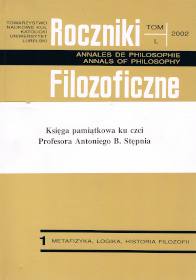The problem of God in contemporary thought
Abstract
Three phenomena strike one when he investigates the history of the issue of God in the 20th century thought: (1) existence of philosophies and ideologies denying God, i.e. various forms of atheism covering an earlier unparalleled range; (2) appearance of philosophies in which the issue of God is not their inner problem (E. Husserl, M. Heidegger); (3) striving after replacing philosophy of God (metaphysical approach) with philosophy of religion, and especially with phenomenology of religion.
The article contains a presentation of the issue of God in the main philosophical trends of the 20th century. Philosophy of God in its metaphysical dimension is still continued in classical philosophy. Phenomenological philosophy of religion, whose main author is M. Scheler, originates in phenomenology. The broadly understood phenomenological trend brought new approaches in which not so much the problem of God's existence and his nature, as the relation between God and man was considered. The approaches are: philosophy of dialogue (M. Buber, G. Marcel), philosophy of encounter (E. Lévinas, F. Rosenzweig), philosophy of gift (J. L. Marion). Also existentialism with its three standpoints is presented in the article: (1) natural (M. Heidegger), (2) negative (J. P. Sartre, A. Camus, M. Merleau-Ponty) and (3) positive (S. Kierkegaard, G. Marcel, K. Jaspers).
In the article also the problem of relations between science and the issue of God is considered, pointing to various solutions (P. Teilhard de Chardin, H. L. Bergson; philosophy of process − A. N. Whitehead, Ch. Hartshorne). A special place is taken by a discussion of the issue of God in philosophy of process.
Copyright (c) 2002 Roczniki Filozoficzne

This work is licensed under a Creative Commons Attribution-NonCommercial-NoDerivatives 4.0 International License.





